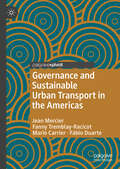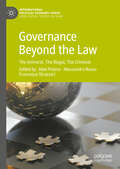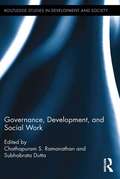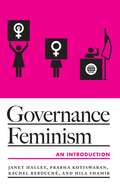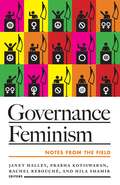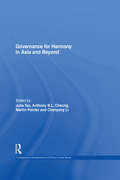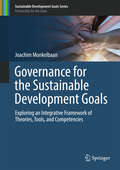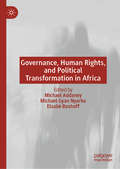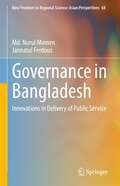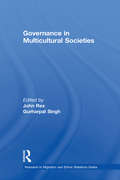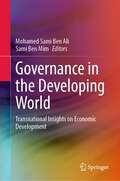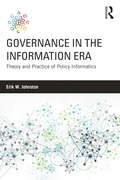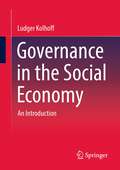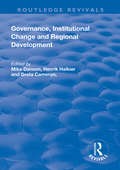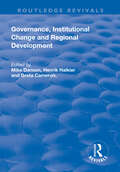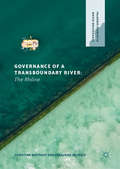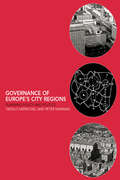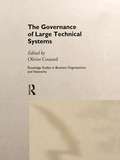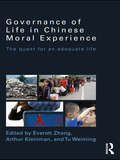- Table View
- List View
Governance and Sustainable Urban Transport in the Americas
by Jean Mercier Fanny Tremblay-Racicot Mario Carrier Fábio DuarteThis volume explores the governance patterns of three cities of the Americas, Seattle, Montreal, and Curitiba, which all present different but interesting cases in dealing with sustainable urban transport challenges. The authors study empirical data from these three cities to analyze how specific governmental and policy instruments (planning, consultation and market mechanisms for example) were implemented in each case. Through concepts coming from policy studies and sociology, for example, such as path dependency, institutional culture and transaction costs, the three cities are also looked at in a broader perspective in order to better understand how they deal differently with their common challenges.
Governance Beyond the Law: The Immoral, The Illegal, The Criminal (International Political Economy Series)
by Abel Polese Alessandra Russo Francesco StrazzariThis volume explores the continuous line from informal and unrecorded practices all the way up to illegal and criminal practices, performed and reproduced by both individuals and organisations. The authors classify them as alternative, subversive forms of governance performed by marginal (and often invisible) peripheral actors. The volume studies how the informal and the extra-legal unfold transnationally and, in particular, how and why they have been/are being progressively criminalized and integrated into the construction of global and local dangerhoods; how the above-mentioned phenomena are embedded into a post-liberal security order; and whether they shape new states of exception and generate moral panic whose ultimate function is regulatory, disciplinary and one of crafting practices of political ordering.
Governance, Development, and Social Work (Routledge Studies in Development and Society #36)
by Chathapuram S. Ramanathan Subhabrata DuttaThis book explores how many issues related to development and governance –including migration, disaster management, environmental justice, peace and security, sustainability, public-private partnerships, and terrorism – impact the practice of social work. It takes a global, comparative approach, reflecting the global context in which social workers now operate.
Governance Feminism: An Introduction
by Janet Halley Prabha Kotiswaran Rachel Rebouché Hila ShamirDescribing and assessing feminist inroads into the state Feminists walk the halls of power. Governance Feminism: An Introduction shows how some feminists and feminist ideas—but by no means all—have entered into state and state-like power in recent years. Being a feminist can qualify you for a job in the United Nations, the World Bank, the International Criminal Court, the local prosecutor&’s office, or the child welfare bureaucracy. Feminists have built institutions and participate in governance.The authors argue that governance feminism is institutionally diverse and globally distributed. It emerges from grassroots activism as well as statutes and treaties, as crime control and as immanent bureaucracy. Conflicts among feminists—global North and South; left, center, and right—emerge as struggles over governance. This volume collects examples from the United States, Israel, India, and from transnational human rights law.Governance feminism poses new challenges for feminists: How shall we assess our successes and failures? What responsibility do we shoulder for the outcomes of our work? For the compromises and strange bedfellows we took on along the way? Can feminism foster a critique of its own successes? This volume offers a pathway to critical engagement with these pressing and significant questions.
Governance Feminism: Notes from the Field
by Janet Halley Prabha Kotiswaran Rachel Rebouché Hila ShamirAn interdisciplinary, multifaceted look at feminist engagements with governance across the global North and global SouthGovernance Feminism: Notes from the Field brings together nineteen chapters from leading feminist scholars and activists to critically describe and assess contemporary feminist engagements with state and state-like power. Gathering examples from North America, South America, Europe, Asia, and the Middle East, it complements and expands on the companion volume Governance Feminism: An Introduction. Its chapters argue that governance feminism (GF) is institutionally diverse and globally distributed—emerging from traditional sites of state power as well as from various forms of governance and operating at the grassroots level, in the private sector, in civil society, and in international relations. The book begins by confronting the key role that crime and punishment play in GFeminist projects. Here, contributors explore the ideological and political conditions under which this branch of GF became so robust and rethink the carceral turn. Other chapters speak to another face of GFeminism: feminists finding, in mundane and seemingly unspectacular bureaucratic tools, leverage to bring about change in policy and governance practices. Several contributions highlight the political, strategic, and ethical challenges that feminists and LGBT activists must negotiate to play on the governmental field. The book concludes with a focus on feminist interventions in postcolonial legal and political orders, looking at new policy spaces opened up by conflict, postconflict, and occupation.Providing a clear, cross-cutting, critical lens through which to map developments in feminist governance around the world, Governance Feminism: Notes from the Field makes sense of the costs and benefits of current feminist realities to reimagine feminist futures. Contributors: Libby Adler, Northeastern U; Aziza Ahmed, Northeastern U; Elizabeth Bernstein, Barnard College; Amy J. Cohen, Ohio State U; Karen Engle, U of Texas at Austin; Jacob Gersen, Harvard U; Leigh Goodmark, U of Maryland; Aeyal Gross, Tel Aviv U; Aya Gruber, U of Colorado, Boulder; Janet Halley, Harvard U; Rema Hammami, Birzeit U, Palestine; Vanja Hamzić, U of London; Isabel Cristina Jaramillo-Sierra; Prabha Kotiswaran, King&’s College London; Maleiha Malik, King&’s College London; Vasuki Nesiah, New York U; Dianne Otto, Melbourne Law School; Helen Reece; Darren Rosenblum, Pace U; Jeannie Suk Gersen, Harvard U; Mariana Valverde, U of Toronto.
Governance for Harmony in Asia and Beyond (Comparative Development and Policy in Asia)
by Anthony B. Cheung Julia Tao Chenyang Li Martin PainterHarmony has become a major challenge for modern governance in the twenty-first century because of the multi-religious, multi-racial and multi-ethnic character of our increasingly globalized societies. Governments all over the world are facing growing pressure to integrate the many diverse elements and subcultures which make up modern pluralistic societies. This book examines the idea of harmony, and its place in politics and governance, both in theory and practice, in Asia, the West and elsewhere. It explores and analyses the meanings, mechanisms, dimensions and methodologies of harmony as a normative political ideal in both Western and Asian philosophical traditions. The book argues that in Western political thought - which sees politics as primarily concerned with resolving social conflicts and protecting individual rights - the concept of harmony has often been neglected. In contrast, since earliest times harmony or 'he' has been a profound theme in Confucian thought, and current leaders of many East Asian governments, and the Chinese government, have explicitly declared that the realisation of a harmonious society is their aim. The book also assesses how harmony is pursued, jeopardized or deformed in the real world of politics, based upon empirical analysis of a variety of different cultural, social and political contexts, including: China, Hong Kong, Singapore, Malaysia, Singapore, Vietnam, Denmark, Latin America and the Scandinavian countries. It shows how harmony as an organizing concept can help to promote new thinking in governance, and overcome problems of modern-day governance like distrust, adversarial conflicts, hyper-individualism, coercive state intervention, and free-market alienation. It also discusses the potential problems posed by the pursuit of harmony, in particular in the grave threat of totalitarianism, and considers how these risks could best be mitigated.
Governance for the Sustainable Development Goals: Exploring An Integrative Framework Of Theories, Tools, And Competencies (Sustainable Development Goals Series)
by Joachim MonkelbaanThis book provides a detailed overview of governance for the Sustainable Development Goals (SDGs). Adopting a unique integrative approach, it examines the fragmentation of governance that is a critical barrier to achieving the SDGs. The main question addressed is: What are the crucial elements and the organizing logic of an integrative framework that is suitable for analysing governance for the SDGs and for implementing the transitions that we need towards a more sustainable world?This transdisciplinary book first proposes a combination of innovative governance theories that can improve the analysis and practice of sustainability governance. Secondly, it explores the interests of core actors in a number of case examples. And thirdly, it offers recommendations for improving the study and practice of sustainability governance.The findings presented form the basis for a new approach to governance towards objectives such as the SDGs: Integrative Sustainability Governance (ISG). The ensuing ISG framework includes indicator frames within the pillars of power, knowledge and norms. The book concludes that the transformation of crisis into sustainability transitions requires a deeper consideration of risk management that strengthens resilience; systems deliberation that complements democracy; and behavioral insights that elevate human awareness and collaboration. This handbook is a comprehensive and valuable companion for students, experts and practitioners with an interest in the SDGs.
Governance grenzüberschreitender Professionalisierung und gesellschaftlicher Integration: Strategien und multiple Rationalitäten beim Aufbau eines kommunalen Bildungsmanagements (Educational Governance #57)
by Katharina LüthiIn diesem Open-Access-Buch wird den Fragen nachgegangen, wie der Akteur Kommunales Bildungsmanagement kollektive Handlungsfähigkeit herstellt und welchen Beitrag diese Koordinationsarbeit zur gesellschaftlichen Integration leistet. Die Rekonstruktion von Arenen, die in einem komplexen Geflecht von Integrationsräumen zusammenwirken, basiert auf Interviewdaten der wissenschaftlichen Begleitforschung zum Programm Lernen vor Ort. Ausgehend von dem Verständnis eines Theorie-Methodenpakets zwischen der interaktionistischen Handlungstheorie und der Grounded-Theory-Methodologie werden zentrale Herausforderungen der Governance-Forschung mithilfe der Zeigestruktur der Erziehung zu einer prozessbezogenen pädagogischen Organisationsforschung zusammengeführt.Dies ist ein Open-Access-Buch.
Governance, Human Rights, and Political Transformation in Africa
by Michael Addaney Michael Gyan Nyarko Elsabé BoshoffThis edited volume examines the development and challenges of governance, democracy, and human rights in Africa. It analyzes the emerging challenges for strengthening good governance in the region and explores issues related to civil, political, economic, cultural, and social rights highlighting group rights including women, girls, and other minority groups. The project presents a useful study of the democratization processes and normative developments in Africa exploring challenges in the form of corruption, conflict, political violence, and their subsequent impact on populations. The contributors appraise the implementation gap between law and practice and the need for institutional reform to build strong and robust mechanisms at the domestic, regional, and international levels.
Governance in Bangladesh: Innovations in Delivery of Public Service (New Frontiers in Regional Science: Asian Perspectives #68)
by Md. Nurul Momen Jannatul FerdousThis book adopts the multidimensional nature of innovation as its point of focus and offers a comprehensive analysis of contemporary governance issues in Bangladesh. Each chapter views those issues from its own disciplinary perspective, but all share a common focus on the current process in the governance of innovation. The authors show how the processes of innovation and public service delivery are influenced while there is simultaneously a striving for a digital Bangladesh. The book presents innovation as a complex phenomenon with multidisciplinary viewpoints affecting its governance. As well, new practices, developments, and empirical research are shown here. The aim is to point out the most persistent difficulties in public administration and public service delivery, with an emphasis on how to deliver public service in Bangladesh in a sustainable manner. Although significant transformations have been made recently for a better organized public sphere, public services still must be more closely in line with what citizens need rather than what service providers are prepared to deliver. This published work speaks strongly to a wide-ranging audience, from scholars of governance and innovation management to academics, researchers, and postgraduate students interested in public service delivery innovations in Bangladesh and South Asia. Indeed, the book serves as a text and valuable resource for postgraduate courses in politics, business administration, economics, political science, development, and governance in South Asia.
Governance in der Sozialwirtschaft: Eine Einführung (Basiswissen Sozialwirtschaft und Sozialmanagement)
by Ludger KolhoffIn diesem Lehrbuch werden Governance-Aspekte auf verschiedenen Ebenen verständlich dargestellt und erläutert: Nach einem Blick auf die wirtschafts- und politikwissenschaftlichen Wurzeln der Governance-Diskussion werden auf der Makroebene „Orders of Governance“ politische und ökonomische Aushandlungs- und Problemlösungsprozesse erörtert und institutionelle und normative Rahmenbedingungen betrachtet; auf der Mesoebene „Cooperation“ geht es um Formen der Steuerung und der Kontrolle sowie um die Kooperation und Koordination von sozialwirtschaftlichen Unternehmen; und auf der Mikroebene „Interactions“ wird Governance aus der Perspektive der Akteure und ihrer Interaktionen behandelt.
Governance in Ethnically Mixed Cities (ISSN)
by Sherrill StroscheinThis collection of original essays breaks new ground by examining the dynamics of ethnic politics at the local level, rather than following in the footsteps of many previous studies which focus on the macropolitical level of states and nations. Governance in Ethnically Mixed Cities is based on extensive fieldwork and local observation, providing perspectives from a range of academic disciplines including Political Science, Geography, and Anthropology. It covers a variety of geographic areas from the Middle East (Kirkuk, Haifa, and Tel Aviv-Jaffa) to Europe (Mostar, Bolzano, Toulouse, and Florence), Central Asia (Osh in Kyrgyzstan) and the United States (Durham, North Carolina). In spite of the variety of disciplinary approaches and geographic diversity of the case studies, the contributing authors uncover a number of common elements of local ethnopolitical dynamics in mixed cities: the power of informal institutions, the effect of numerical balances between groups on local politics, and the significance of local competition for material and symbolic resources. Each of these areas provides a promising avenue for future research.
Governance in Multicultural Societies (Research in Migration and Ethnic Relations Series)
by Gurharpal SinghIn the last decade the study of multiculturalism has become an established field in political and social theory. This in-depth and engaging volume focuses on public policy and the dilemmas faced by the governments of increasingly diverse societies. Offering a theoretically and empirically rich collection of essays from some of the leading specialists in the field, it fills the gap between the social and political theory of multiculturalism and institutionally based national case studies. The book is distinctive in combining a robust theoretical introduction to recent developments in multiculturalism with a critical evaluation of contemporary public policy in a variety of countries in Europe, South Asia, Southeast Asia, the Far East and South Africa. It incorporates a strong comparative dimension both within and across the case studies, with a regional focus enabling comparisons of regional, national and international experience.
Governance in the Asia-Pacific
by David Goldblatt Richard Maidment Jeremy Mitchell]IGovernance in the Asia-Pacific is a student-friendly textbook which examines the governance of nation states in this diverse and rapidly-changing region. It sets out the range of political beliefs and styles that flourish and the similarities and differences between individual states and the ways in which they choose to govern. Wide-ranging in scope and clearly written to help students get to the bottom of important issues, the book addresses many key areas including:* the Anglo-American powers* Japan* independence movements* the politics of economic development* social movements* the politics of the environment* the pressures for political change in the region.And these issues are all analysed within the broad context of governance in the Asia-Pacific more generally. The authors also identify factors which explain the political underpinning of the dramatic economic development in the region.
Governance in the Developing World: Transnational Insights on Economic Development
by Mohamed Sami Ben Ali Sami Ben MimThis book assesses the extent to which good governance may contribute to enhancing economic performance and social welfare in developing countries, globally. Governance has been pointed out as one of the major weaknesses of developing economies and may largely be attributed to weak governance practices at both the macro- and micro-level. This book highlights the channels through which governance may act on various economic sectors and different key economic variables. In doing so, it enables policymakers to identify and implement policies and procedures to promote good governance. This book provides a transnational perspective on good governance in considering developing countries in Asia, Africa and beyond, presenting respective case studies in single country settings, enabling a comparative perspective between and across all chapters. Covering topics that include the intersection between governance and gender, inequality, poverty, education and health, the book provides diverse theoretical and empirical evidence on important issues facing policymakers, investors and other stakeholders and is relevant to graduate students and researchers interest in policy issues in the developing world.
Governance in the Information Era: Theory and Practice of Policy Informatics
by Erik W. JohnstonPolicy informatics is addressing governance challenges and their consequences, which span the seeming inability of governments to solve complex problems and the disaffection of people from their governments. Policy informatics seeks approaches that enable our governance systems to address increasingly complex challenges and to meet the rising expectations of people to be full participants in their communities. This book approaches these challenges by applying a combination of the latest American and European approaches in applying complex systems modeling, crowdsourcing, participatory platforms and citizen science to explore complex governance challenges in domains that include education, environment, and health.
Governance in the Social Economy: An Introduction
by Ludger KolhoffIn this textbook, governance aspects are presented and explained in a comprehensible way at different levels: After a look at the roots of the governance discussion in economics and political science, political and economic negotiation and problem-solving processes are discussed on the macro level "Orders of Governance" and institutional and normative framework conditions are considered; on the meso level "Cooperation", forms of steering and control as well as cooperation and coordination of social economy enterprises are dealt with; and on the micro level "Interactions", governance is dealt with from the perspective of the actors and their interactions.
Governance, Institutional Change and Regional Development (Routledge Revivals)
by Mike Danson Henrik Halkier Greta CameronThis title was first published in 2000: This volume addresses the prominent role given to institution-building, institutional change and governance in the regional development strategies and policies. The establishment of the Scottish Parliament, Welsh and Northern Ireland Assemblies, and the arrival of regional development agencies in England highlighted the need to put the initiatives into some context, drawing on experience from across Europe on the critical factors in the determination of the potential and success of regions. Central to the discussions presented here by a group of European experts are the question of governance - how does an ongoing process of institution-building affect the ways in which regions and localities are governed, including questions of democracy, participation, regional self-determination, public-private partnerships, networks and accountability; and the consequences of new modes of governance and institutional change for regional development strategies and policies, particularly in the context of large-scale industrial restructuring and city-region and urban regeneration.
Governance, Institutional Change and Regional Development (Routledge Revivals)
by Mike Danson Henrik Halkier Greta CameronThis title was first published in 2000: This volume addresses the prominent role given to institution-building, institutional change and governance in the regional development strategies and policies. The establishment of the Scottish Parliament, Welsh and Northern Ireland Assemblies, and the arrival of regional development agencies in England highlighted the need to put the initiatives into some context, drawing on experience from across Europe on the critical factors in the determination of the potential and success of regions. Central to the discussions presented here by a group of European experts are the question of governance - how does an ongoing process of institution-building affect the ways in which regions and localities are governed, including questions of democracy, participation, regional self-determination, public-private partnerships, networks and accountability; and the consequences of new modes of governance and institutional change for regional development strategies and policies, particularly in the context of large-scale industrial restructuring and city-region and urban regeneration.
Governance, Migration and Security in International Relations
by A. K. M. Ahsan Ullah Jannatul FerdousThe book deconstructs the interplay between governance, migration, international relations, and security as a complex and constantly evolving dynamic that has significant implications for individuals, societies, and nations around the world. This book shows that the connections between governance, migration, international relations, and security have become increasingly significant for several reasons. First, it unpacks how globalization has led to an unprecedented level of interconnectedness between nations, resulting in a need for increased understanding of how governance frameworks, migration patterns, and international relations impact security both within and between nations. Second, it shows that the movement of people across borders has become a significant challenge, with more people on the move now than at any time in human history. Third, it highlights the increasingly complex and interdependent nature of international relations, which requires a nuanced understanding of howdifferent actors, including governments, international organizations, and non-state actors, interact and influence each other. Fourth, the book addresses how security concerns have become increasingly pressing in today's world, with the rise of non-state actors, such as terrorist groups, as well as the proliferation of cyber threats. The book positions that an understanding of these dynamics, and their implications, is critical for both academics and policymakers, to build effective international partnerships and respond to global challenges such as climate change, pandemics, and economic crises. It is relevant to researchers across the social sciences, including development studies, international relations, global politics, migration, public health, and environmental policy.
Governance of a Transboundary River: The Rhône (Palgrave Studies in Water Governance: Policy and Practice)
by Christian Bréthaut Géraldine PfliegerThis book examines the issues at stake in transboundary water governance, it spotlights the Rhône River, a biophysical entity of enormous historical, political and economic importance. The Rhône has long been viewed essentially as a tool for energy production, heavily canalized and exploited by a series of dams and nuclear power plants – with the result that those who live along this great river have simply turned away. Basing their work on a detailed analysis of the history and the current management of the Rhône, the authors explore the challenges linked with transboundary river basin governance including relevant international water law, appropriation of river and river resources by Nation States. Finally, they discuss a diverse range of institutional architectures and outlines several solutions that might cope with the growing complexity of transboundary management of a major river. The book will be of interest to scholars in fields such as environment studies, water policy and Natural Resource Management, it also has relevance to water managers and entrepreneurs concerned with staying abreast of developments in water policy and governance.
Governance of Europe's City Regions: Planning, Policy & Politics
by Peter Newman Tassilo HerrschelGovernance of Europe's City Regions considers the changing role of the European Union in regional issues, explores how national governments have become increasingly involved at the regional scale and examines the constitutional and political contexts in which regional and local governments operate. Detailed case studies of regionals in Germany and England illustrate contrasts in European approaches to the scale of government, and the complex interactions of international, national, regional and local scales of policy intervention. The book offers a unique perspective, which links together an analysis of both regional Europe and the local economic and political factors that shape successful regions.
The Governance of Female Drug Users: Women's Experiences of Drug Policy
by Natasha Du RoseAvailable Open Access under CC-BY-NC licence. This book is the first to examine how female drug user's identities, and hence their experiences, are shaped by drug policies. It analyses how the subjectivities ascribed to women users within drug policy sustain them in their problematic use and reinforce their social exclusion. Challenging popular misconceptions of female users, the book calls for the formulation of drug policies to be based on gender equity and social justice. It will appeal to academics in the social sciences, practitioners and policy makers.
The Governance of Large Technical Systems (Routledge Studies in Business Organizations and Networks #No.13)
by Olivier CoutardThis work examines the governance of large technical systems (LTS) at firm, imdustry and state levels and the interactions between the systems and society. In particular, international contributors explore the implications of major technological , economic and social changes during the last twenty years for traditional forms of LTS governance. Their research is centred around the following themes:* traditional forms of governance* new regulatory challenges* the governability of complex technologies* conceptual issues related to the governance of inter-organizational networks
Governance of Life in Chinese Moral Experience: The Quest for an Adequate Life
by Everett ZhangChina has experienced a tremendous turn-around over the past three decades from the ethos of sacrificing life to the emergent appeal for valuing life. This book takes an interdisciplinary look at China during these decades of transformation through the defining theme of governance of life. With an emphasis on how to achieve an adequate life, the contributors integrate a whole range of life-related domains including: the death of Sun Zhigang, the peril caused by rising tobacco consumption, the emerging suicide intervention, the turning points in the fight against AIDS, the intensely evolving birth policy, the emerging biological citizenship, and so on. In doing so, they explore how biological life has been governed differently to enhance the wellbeing of the population instead of promoting ideological goals. This change, dubbed "the deepening in governmentality," is one of the most important driving forces for China’s rise, and will have huge bearings on how the Chinese will achieve an adequate life in the 21st century. This book presents works by a number of internationally known scholars and will be of interest to students and scholars of anthropology, sociology, political science, history, Chinese philosophy, law, and public health.
